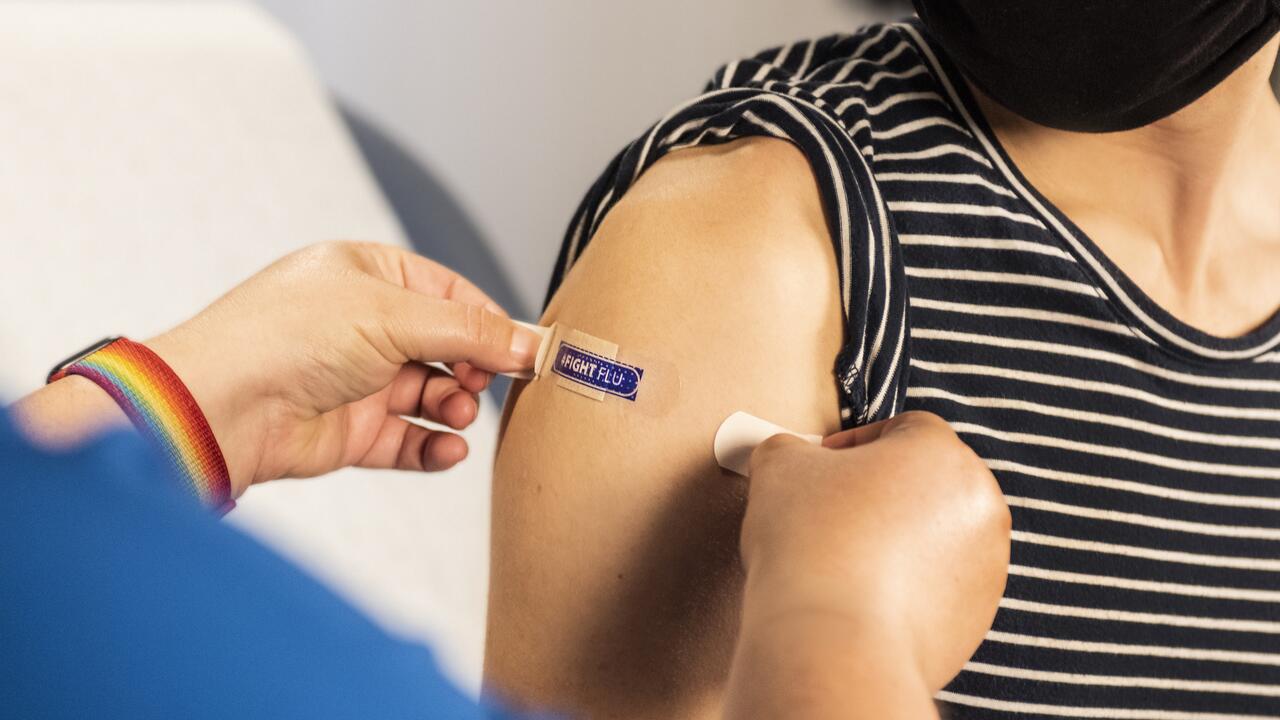
Q and A with the experts: How can we protect our health this fall virus season?
Professor Mark Servos discusses new variants of COVID-19 and the flu season

Professor Mark Servos discusses new variants of COVID-19 and the flu season
By Angelica Marie Sanchez University RelationsThe fall season means an increased risk of respiratory illness as we spend more time indoors with groups of family and friends. We can help protect ourselves and others by getting the flu vaccine and a booster shot for COVID-19 as cases for new variants rise globally.
What do you need to know about the ongoing risk of COVID-19? Mark Servos, professor and Canada Research Chair in Water Quality Protection in the University of Waterloo’s Department of Biology, provides answers and educational resources. Servos and his team have been running wastewater surveillance for COVID-19 since early in the pandemic.
What does the Region of Waterloo wastewater surveillance system indicate about the trends of SARS-CoV-2 (i.e., COVID-19)?
Our Waterloo research team has been reporting on the trends of SARS-CoV-2 and its variants (the virus that causes COVID-19) in wastewater directly to the local Public Health Unit since early in the pandemic. Wastewater has proven to be a reliable and accurate way to track COVID-19 infections in the community. We have recently seen a rise in the virus across the region and a shift in the mix of the variants present (e.g., subvariants of XBB). This situation can change quickly. You can follow the wastewater trends at the Region of Waterloo’s public website.
Is COVID-19 still a concern and what are the ongoing risks?
Yes, COVID-19 continues to be a serious concern. Although COVID-19 hospitalizations and deaths have declined in recent months, the COVID-19 virus continues to circulate in our community and represents a health threat to everyone. As we congregate in indoor settings and as new variants continue to emerge, we can expect COVID-19 to spread more widely.
People with COVID-19 have had a wide range of symptoms, including fever and chills, cough, shortness of breath, fatigue, muscle or body aches, headaches, loss of taste or smell, sore throat, congestion or runny nose, nausea or vomiting and diarrhea. There are also people that may be more susceptible to developing severe disease, so we need to work together to continue to protect ourselves, as well as others around us.
The level of immunity in our community acquired through vaccines and/or naturally means that for many people the likelihood of severe disease and hospitalization is reduced relative to the past waves. However, a large portion of our community will remain vulnerable, especially immune compromised and older individuals. Although COVID-19 can make you very sick, we must also remain concerned about complications of the COVID-19 infections that can impact your long-term health. Even people with mild symptoms can experience long term on-going health problems as a result of an infection.
How can I tell the difference between the flu and a variant of COVID-19?
We expect that the wave of COVID-19 this fall may coincide with other seasonal respiratory viruses, as it did last year. The symptoms of COVID-19 and the flu (e.g., influenza) are very similar and both can cause serious illness. If you are sick, you will not know what you have unless you are tested. You should always follow the Region of Waterloo health guidelines to protect your health.
What can I do to protect myself and my community?
We should all follow advise from Public Health Agencies that are currently encouraging everyone eligible to get the new vaccine as soon as it is available. The effectiveness of vaccines wane after a few months so we need to continue to update our vaccinations. As the new vaccine anticipated this fall is based on a recent dominant variant it should work well at preventing severe disease caused by the currently circulating sub-variants. People that were vaccinated more than six months ago and are vulnerable or concerned should consult with their doctor.
People can still get exposed to COVID-19 and be able to spread the virus even when they have no symptoms. We all need to be aware of our health (COVID-19 symptoms) and help to reduce the spread of the virus to others who may be less fortunate and develop more severe symptoms. Our health-care system remains vulnerable and reducing the spread of COVID-19 (and other viruses) will help to protect our community.
We need to be vigilant and be prepared to respond as this virus continues to evolve and threaten our communities. Washing hands, social distancing, masking and vaccines have all proven to be very effective ways to reduce the spread of disease. Learn more on how to protect yourself from COVID-19 on the Ontario Government website.
August 25 - Protect yourself and protect others this fall
With the return of students to the University for the fall term, you should be aware that respiratory illnesses such as COVID-19, respiratory syncytial virus (RSV), and influenza continue to circulate in our community both on-campus and off. There are steps you can take to protect yourselves and those around you.
Maintaining up-to date vaccinations for COVID-19 and influenza remain the most important protective measures you can take.
We also encourage you to think of the people around you and help limit the spread of COVID-19 by wearing a mask in indoor settings.
Additionally, if you are experiencing symptoms of COVID-19, protect your colleagues or classmates by not coming to campus.
Learn more on the University’s latest update on the COVID-19 website.
Campus Wellness offers Pfizer and Moderna COVID-19 vaccines and boosters to all Waterloo students, staff and faculty. You can book an appointment by contacting Health Services at 519-888-4096.
For more information, please visit the Campus Wellness website to learn more about how to prepare for your COVID-19 vaccine and booster immunization.
Location
University of Waterloo Health Services Building
200 University Avenue West
Waterloo, ON, Canada N2L 3G1
+1 519-888-4096
Pfizer booster doses are also available to students, staff and faculty via a walk-in service in the Student Health Pharmacy on the lower level of the Student Life Centre.
Location
University of Waterloo - Student Health Pharmacy
SLC - Student Life Centre
200 University Avenue West
Waterloo, ON, Canada N2L 3G1
+1 519-746-4500
This series is produced for the media, and its purpose is to share the expertise of UWaterloo researchers. To reach this researcher, please contact media relations.

Read more
How Doug Kavanagh’s software engineering degree laid the foundation for a thriving career in patient care

Read more
Upside Robotics secures new funding to accelerate the future of sustainable farming

Read more
Discover the meticulous work that uncovered Black stories on campus and preserved them for the future
The University of Waterloo acknowledges that much of our work takes place on the traditional territory of the Neutral, Anishinaabeg, and Haudenosaunee peoples. Our main campus is situated on the Haldimand Tract, the land granted to the Six Nations that includes six miles on each side of the Grand River. Our active work toward reconciliation takes place across our campuses through research, learning, teaching, and community building, and is co-ordinated within the Office of Indigenous Relations.